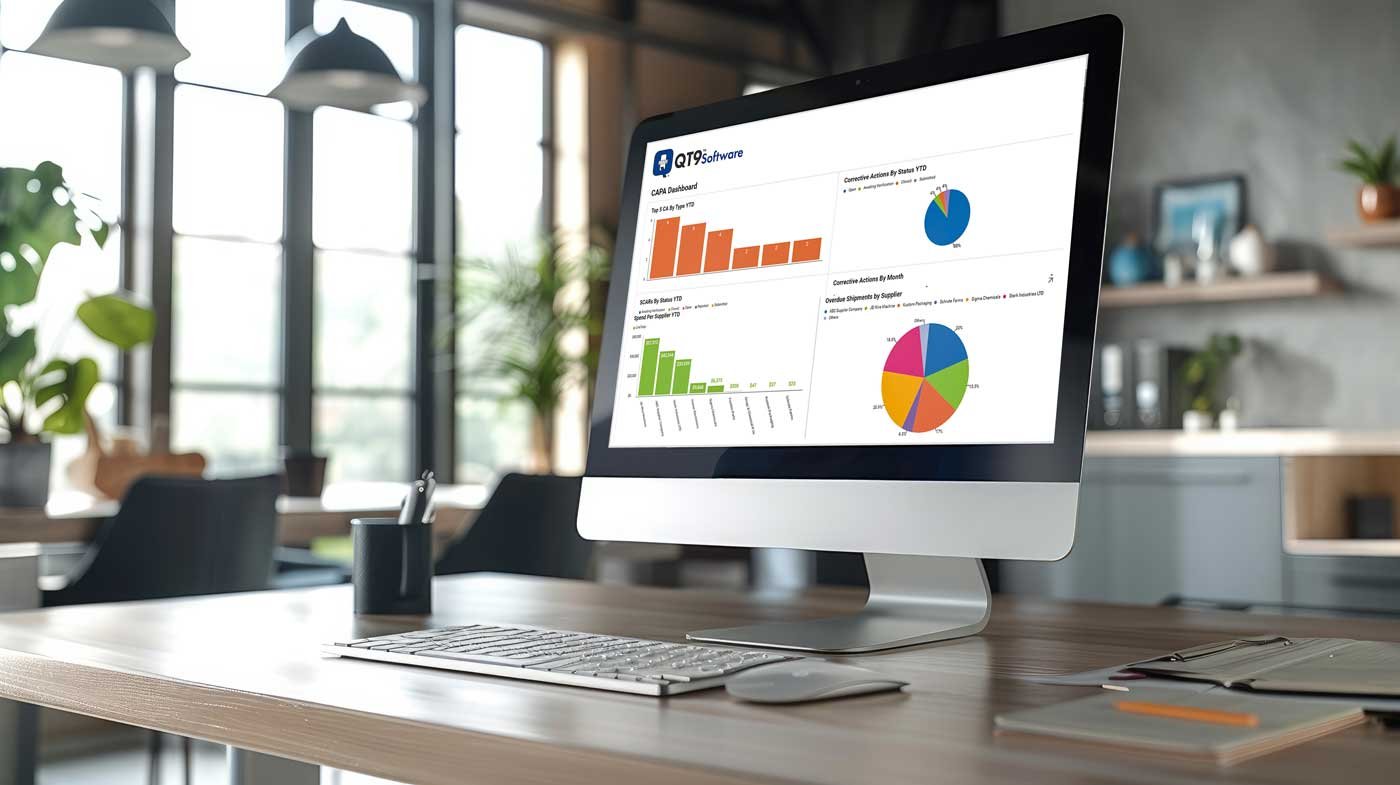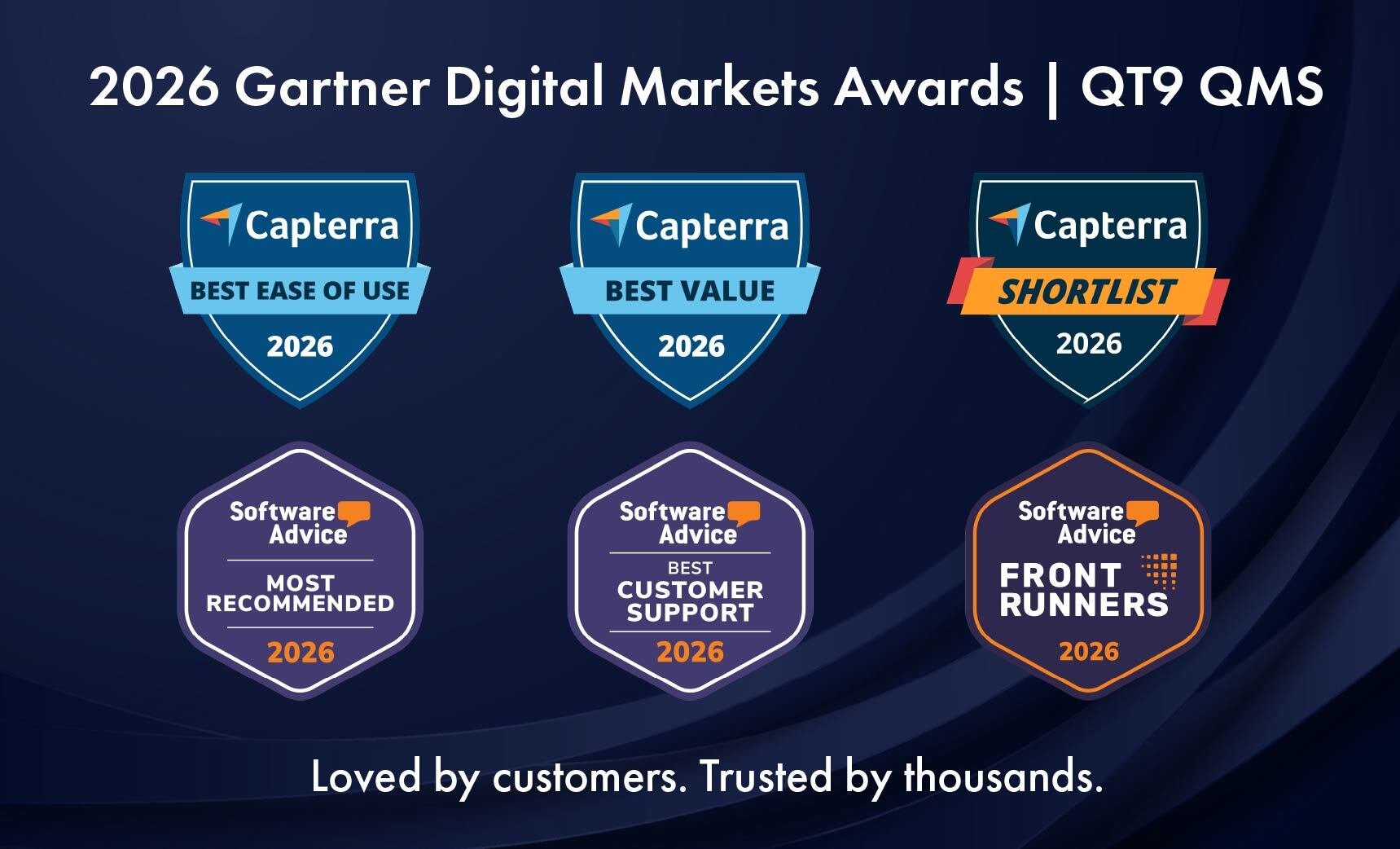Current Good Manufacturing Practice (cGMP) Compliance Made Easy
Centralize and streamline cGMP compliance with QT9 QMS and QT9 ERP.
Pharmaceuticals
QT9 QMS helps pharmaceutical companies simplify cGMP compliance, while QT9 ERP supports connected manufacturing, inventory, and operational processes.
Medical Devices
QT9 QMS supports ISO 13485 and FDA compliance for medical device manufacturers, with QT9 ERP connecting production and supply chain data to accelerate time to market.
Food & Beverages
QT9 QMS strengthens food safety and quality compliance, supported by QT9 ERP features for supplier management, inventory control, and risk reduction.
Dietary Supplements
QT9 QMS enables automated quality and compliance processes, while QT9 ERP supports facility operations, training records, and data visibility to help ensure product safety.
Keep your cGMP processes current and on track
QT9 QMS meets the quality and compliance requirements for life sciences organizations operating under current Good Manufacturing Practice (cGMP) regulations, with QT9 ERP supporting connected manufacturing, inventory, and operational processes.
Simplified cGMP compliance
Automated and integrated processes, such as document management, corrective actions and auditing, put compliance on auto-pilot and reduce the risk of non-compliance.
Enhanced operating efficiency
Reduce manual paperwork, improve workflows and get built-in traceability through QT9 QMS automated processes and centralized data.
Streamlined audits and inspections
Simplify internal and external audits and inspections with features like automated scheduling. Easily track and report compliance data in one central location, enabling easier risk analysis, issue resolution and data analysis.
Reduced costs
Reduce errors, rework and inefficiencies, and lower operational costs, by getting your entire team involved in quality control.
Improved customer experience
Enhance customer engagement with features such as online customer surveys and electronic document approvals so customer issues can be resolved quickly. QT9 QMS offers three dedicated customer management modules, including a Customer Web Portal.

See how QT9 QMS and QT9 ERP stack up against cGMP standards.

QT9 is available in the cloud or on-premise
Flexible deployment to match your IT strategy without compromising security or speed.
Work smarter with intelligent automation in quality and compliance
QT9 Software’s built-in automation streamlines compliance workflows, quality checks, and alerts, reducing human errors, accelerating decision-making and freeing your team to focus on higher-value work.
Speed up implementation with pre-validated software
QT9 Software offers a fully pre-validated environment, with every module and feature tested and documented for compliance. Save time, avoid costly internal validation processes and go live faster with confidence.
Ensure audit-ready traceability across all processes
Track every action, change and event in real time with QT9 Software. Timeline-based traceability supports inspections, audits and product recalls by providing complete visibility into your processes and product history.
Empower teams with secure, self-service portals
QT9 Software provides dedicated web portals for employees, suppliers and customers, enabling secure self-service access to documentation and data while streamlining collaboration across your organization.
Catch and resolve issues instantly with real-time monitoring
Monitor operations live with real-time dashboards and automated alerts using QT9 Software. Enable proactive responses to nonconformances, minimize downtime and improve compliance outcomes across your organization.
Onboard faster with an intuitive, user-friendly platform
Whether you’re a startup or an enterprise, QT9 Software’s clean, intuitive interface minimizes the learning curve, empowering users to work confidently, complete tasks accurately and stay audit-ready from day one.

Pre-validated QMS software
-
FDA and ISO Compliance out-of-the-box
-
Rapid cloud deployment for faster implementation
-
Audit-ready with timeline traceability
-
Electronic signature approvals & secure access controls
-
Continuous validation & updates
|
• ISO 13485 |
• FDA 21 CFR Part 11 |
QT9 QMS includes a complete execution of all protocols, including Installation Qualification (IQ), Operation Qualification (OQ) and Performance Qualification (PQ).
-
Eliminates costly internal QMS validation efforts that can take months of staff time or cost thousands in consultant fees.
-
Reduces downtime waiting for your QMS to be approved for use.
-
Minimizes the risk of any failed audits due to flawed validation protocols.
FAQ: Current Good Manufacturing Practices (cGMP)
cGMP stands for Current Good Manufacturing Practice, which encompasses the U.S. Food and Drug Administration’s regulations for ensuring the consistent quality and safety of products manufactured by the industries it regulates: food, drugs, biologics and medical devices.
As stated by the FDA, “cGMP provides for systems that assure proper design, monitoring, and control of manufacturing processes and facilities.” Under cGMP, manufacturers in these industries must adequately control operations by establishing strong quality management systems, obtaining quality raw materials, detecting and investigating product quality deviations and maintaining reliable testing laboratories.
The main objective of cGMP is to protect the health and safety of consumers. Through steadfast enforcement of cGMP regulations, consumers are able to have confidence in the quality, safety and efficacy of the drugs, food and medical equipment available to them.
cGMP is important to manufacturers who must successfully comply with its regulations in order to market their products in the United States. The FDA monitors compliance by conducting regular inspections of facilities, examining physical conditions as well as required documentation.
Without continued adherence to cGMP, manufacturers run the risk of being forced to issue product recalls, pay fines or worse.
cGMP and GMP are built along the same basic good manufacturing principles, but they differ in scope.
GMP is a broad set of quality guidelines applicable to many industries. It forms the basis of regulations in many different countries. Although specific requirements vary depending on industry and location, common requirements include:
- Instructions and procedures that are clear and well-documented
- Educated and trained workers who understand their roles
- Facilities and staff cleanliness and hygiene
- Adequate control of materials at each stage of production
In contrast, cGMP is a group of mandatory regulations tailored to the industries supervised by the U.S. FDA, including pharmaceuticals, dietary supplements, medical devices, food and beverages. The “c” in cGMP differentiates the FDA’s regulations and reflects the FDA’s efforts to encourage use of the most current quality controls.
Though not the sole focus, pharma compliance remains a large part of cGMP regulatory activity. The primary standard outlining steps for meeting minimum cGMP is FDA 21 CFR Part 211. Being able to meet its standards is required for FDA approval, with the goal of assuring that “the drug products have the identity, strength, quality, and purity they purport.”
FDA 21 CFR Part 210 is used in conjunction with Part 211. Where Part 211 focuses on process control for finished pharmaceuticals, Part 210 puts forth minimum standards for manufacturing, facilities and controls.
The best QMS software for FDA-regulated companies is one that:
- Offers a pre-validated environment, saving users time and speeding adoption
- Enables audit-ready traceability across all processes
- Provides real-time visibility for faster response to nonconformances
- Automates and integrates compliance workflows, quality checks and alerts
- Has an intuitive, user-friendly platform
QT9 QMS is a top choice for FDA-regulated companies because it offers validated compliance with 21 CFR parts 11, 210-211 and 820 (QSR, QMSR). QT9’s cloud-based platform, modular structure and seamless integration with QT9 ERP make it ideal for medical device, pharmaceutical and nutraceutical manufacturers who need both compliance assurance and operational efficiency.
QT9 QMS automates and streamlines multiple quality processes in one integrated solution for the pharmaceutical industry. QT9 QMS provides more than 25 modules in its standard offering that automate and centralize key quality processes, such as:
- Document control
- Risk management
- Employee training
- Measurement and testing
- Inspections
- Corrective and Preventive Actions (CAPAs)
- Supplier management
- Customer feedback
- Electronic batch records
- Inventory control
- Management review
- Regulatory compliance
QT9 QMS is a highly rated, affordable and easy to use quality management system that excels at all of the processes that go into providing high-quality goods and services that are FDA and ISO compliant.
Explore quality management resources

QT9 QMS Earns 2026 Top Honors from Capterra and Software Advice

Best CAPA Software for 2026: Capabilities, Comparison and Guidance

Best Software for Inventory Management in Regulated Manufacturing
Try QT9 for free
Ready to simplify your quality processes? No credit card needed.